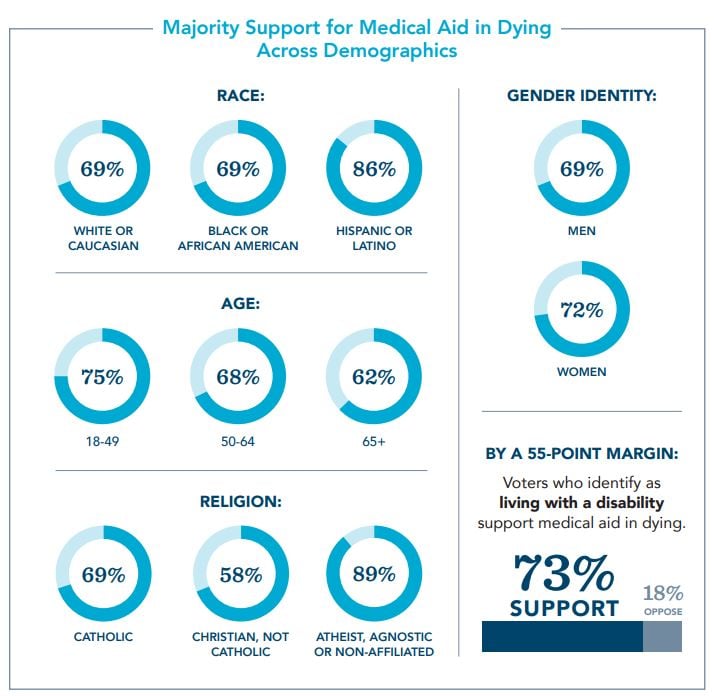The Illinois End-of-Life Options for Terminally Ill Patients Act (SB 3499), which would authorize medical aid in dying in Illinois, was introduced in the Senate on February 9, 2024 by Assistant Majority Leader Linda Holmes (D-42). This legislation would allow a mentally capable, terminally ill adult with a prognosis of six months or less the option to obtain a prescription medication they may decide to take so they can die peacefully and end their suffering.
Criteria and Safeguards
Medical aid in dying is a trusted and time-tested medical practice that is part of the full spectrum of end-of-life care options, including hospice and palliative care.
Medical aid in dying is authorized in 10 states and Washington, D.C. In the 26 years since the first medical aid-in-dying law went into effect in 1997 in Oregon, there have been no substantiated cases of abuse or coercion.
- Qualified individuals must be able to self-administer (i.e., self-ingest) the medication.
- Physicians must inform the requesting individual about all of their end-of-life care options, including comfort care, hospice, palliative care, and pain control.
- No physician, health care provider or pharmacist is required to participate in the law.
- The individual can withdraw their request for medication or change their mind after receiving the medication and decide not to take it.
- An individual’s providers may refer the person for a mental health evaluation to ensure the person’s capacity to make an informed decision.
- The law includes multiple protections to prevent coercion including strict eligibility requirements, two separate physician assessments, and mandatory counseling on all treatment options. The law makes it a felony to coerce someone to request the medication or to forge a request.
- Life insurance payments cannot be denied to the families of those who use the law.
- Healthcare providers who participate and comply with all aspects of the law are given civil and criminal immunity.
- Healthcare providers must submit documentation of medical aid-in-dying deaths to the state health department, so it can compile an annual report for lawmakers and the public.
- Death certificates list the terminal disease as the cause of death consistent with statutory language to provide accurate data and to prevent inappropriate suicide investigations.
Additional Regulatory Requirements
- Two verbal requests for the medication directly from the patient, with a 5-day waiting period between the first and second request.
- A written request is also required from the individual requesting medical aid in dying.
- Prescribing physicians must comply with medical-record documentation requirements.
- Unused medication must be disposed of according to state and federal law.
Polling: 71% of Illinois Voters Support Medical Aid in Dying

Source: Impact Research conducted a live phone and text-to-web survey of 700 likely 2024 voters in Illinois from February 6–12, 2023. The poll does not include demographic groups that represent single-digit percentages of Illinoisans because of insufficient sample. Accessed at bit.ly/ILImpactResearchPollMAID2023
Polling: Most Illinois Physicians Support Medical Aid in Dying
- When informed of eight key provisions of the proposed legislation, Illinois physicians support medical aid in dying by a margin of 68% support - 20% oppose.
- Sixty-two percent of Illinois doctors say they would like to have the option of medical aid in dying if they become terminally ill, compared to 20% who would not.
Source: Medscape hosted this survey on its platform for 15 days in 2021, obtaining 409 responses that met targets for specialty and gender ratios based on the Association of American Medical Colleges (AAMC) 2021 Illinois Workforce Profile1. Accessed at bit.ly/WebMdILDocsMAIDpoll2023
For more information:
- Amy Sherman, Illinois Advocacy Director, Compassion & Choices Action Network, (224) 251-0902, [email protected]
- Khadine Bennett, Director of Intergovernmental Affairs and Advocacy, the ACLU of Illinois, [email protected]
The Illinois End-of-Life Options Coalition is a partnership between Compassion & Choices Action Network, ACLU of Illinois and Final Options Illinois dedicated to authorizing medical aid in dying as an option for terminally ill adults in Illinois.


